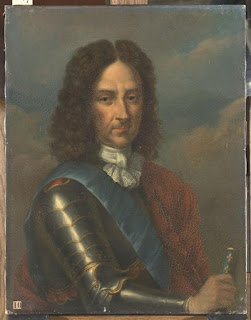The Siege of Gerona, 1684 - Part Two
Jose Maria - After a few years in which tension with France was common, and in which Alejandro Bournonville, viceroy of Catalonia, was especially concerned about the defenselessness of the Principality of Catalonia, the official start of the war in November 1683 meant that the viceroy had to face the most difficult moments of his long political and military trajectory. The situation of the French preparations contrasted with that of the Spanish army of Catalonia. The viceroy claimed to have no money, grain, or carriages for field artillery and could not oppose such a powerful enemy in a field battle.
On May the 1st, the French army crossed the border through La Junquera pass. Viceroy Bournonville gallantly marched with his troops towards Hostalric ,in order to face some 10,500 French infantrymen and 4,500 horsemen; presumably these were heading towards Gerona, where the French would expect their navy to make an incursion to divert the Viceroy's troops to the coast and force the Spaniards to properly garrison Barcelona.
The next day, 2nd of May, Domingo Pignatelli (or Piñateli), general of the artillery of the Spanish army, arrived to Gerona. He gathered all the forces and took charge of the defense of the city.
Bournonville's dilemma was to stop the enemy in Gerona, bringing part of his troops into that city, or to return to Barcelona and defend it against a potential direct attack. The events showed that, despite the arrival of 1,500 men from the" Tercio of Granada city" and "Tercio of the Coast of Granada" , the numerical inferiority of the Hispanic hosts made it impossible to stop the rival in the open field.
Bournonville, upon learning that French commander in chief, Marshall Bellefonds had set up his camp in Báscara, 5 km from Gerona, ordered the removal of two Tercios and two cavalry squadrons from the mountain garrisons to take them to Gerona.
On May 12th, the viceroy of Catalonia arrived in the city offering to support them with part of the Spanish army, and, in effect, with the darkness of night, he left for Hostalrich to meet the French and try to blockade them and cause damage to their numerically superior army before they reach the walls of Gerona.
When the French army moved, Viceroy Bournonville tried to stop them by fortifying a pass of the river Ter in Pont-Major, raising an artillery position and some trenches , placing a battery, while the cavalry was in charge of closing the nearby mountain passes. Bournonville had 3,000 infantry and 2,000 horsemen to stop their enemy (roughly 15.000 or 16.000 men), holding the position during several attempts to cross the river by the French. The Spaniards sent musketeer mangas (wings) and dismounted dragoons that shot with sharpshooter precision... 1000 French cavalrymen, with some infantrymen also mounted, tried to cross the bridge, and many tried swimming ! but they could not, so they French went to a different position in order to outflank the fortified Spanish troops.
Finally the French only succeeded at crossing the river at night, but without preventing the orderly withdrawal of the Spanish troops to Gerona, including all the guns, thanks to a valiant defense by troops of the Tercio de Barcelona, whose Sargento Mayor, Montaner, with selected musketeers, protected the artillery trayne back to Gerona, without losing a single cannon, leaving Pont Major pass to the French.
So Bellefonds finally seized Pont-Major at night at the cost of some 1,000 casualties against 150 Spanish, and he fortified it, and formally initiating the siege of Gerona by placing detachments at all the passes.
With the arrival of artillery and reinforcements, Bellefonds' forces numbered between 16,000 and 17,000 troops.
So Bournonville faced with the imminence of the assault on Gerona, asked Barcelona for a reinforcement of a Tercio of relief. The city responded by raising a new Tercio of 600 men, plus a company of 60 to cover the losses of the Tercio de Barcelona. The new group left Barcelona on May 25th , 6 days after Bournonville's request. Barcelona agreed to pay for Gerona's defense to try to prevent herself from reaching the same situation.
So in Gerona, there were at least:
-Tercio de sevilla "Old Purples"- D. Tomas Arias Pacheco
-Two German Regiments: Christian Baron Bek and other.
-Tercio of Gerona (town militia) colonel Dr. Juan Vilar
-Tercio de Barcelona
-Tercio de la Diputación
-Tercio de Granda -Antonio Serrano
-Tercio de la costa de granada
-Tercio de Toledo "old blues"- D. Manrique de Noroña
-300 dragones led by Sargento general de batalla D. Jose de Agulló
-Cavalry mounted and dismounted of several Trozos (regiments)
-Various militia (composed of priests, the different guilds, and students)


